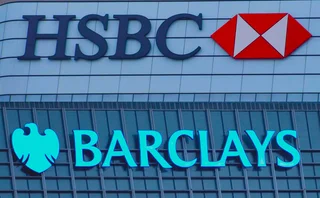
EFG Private Bank hit by FCA’s first fine
Bank fined £4.2 million for failures in anti-money laundering controls

EFG Private Bank has been fined £4.2 million for failures in its anti-money laundering (AML) controls, the first monetary penalty imposed by the new Financial Conduct Authority (FCA).
The UK arm of Swiss bank EFG International had serious failings in its AML controls which lasted for more than three years, the FCA found.
While the investigation was instigated in 2011 by the Financial Services Authority (FSA), Malcolm Taylor, global head of corporate development at data and software provider BankersAccuity, says the fine is important for the FCA.
"It's interesting they've chosen to make this public in April when they've obviously only come into force at the beginning of the month," he says. "It's good to raise their profile and establish their organisation as an organisation which is not afraid to exercise their powers."
Tony Woodcock, head of the regulatory litigation practice at law firm Stephenson Harwood, expects the FCA to take an even tougher approach than the FSA. While proceedings related to individuals involved in EFG have not been announced, Woodcock says this is something to look out for in the coming months.
"What we'll have to keep an eye over is the FCA not just taking a slug out of the institution and fining them but also out of senior individuals," he says. "Here, you might see for example a compliance officer or a head of anti-money laundering risk being hung out to dry – possibly someone even more senior than that."
At the end of 2011, around 400 of EFG's 3,342 customer accounts were deemed by the firm to present a higher risk of money laundering or reputational risk, and of these 94 were held by politically exposed persons (PEPs).
Customer due diligence highlighted significant money laundering risks in 17 of 36 reviewed customer files, opened between December 2007 and January 2011, but there was insufficient record of how the bank's senior management had mitigated those risks.
The risks highlighted in 13 of these files related to allegations of criminal activity, or that the customer had been charged with criminal offences including corruption and money laundering.
Of the 99 PEP and other high-risk customer files reviewed by the FSA, 83 raised serious concerns about EFG's monitoring of the relationship.
"Banks are the first line of defence to make sure that proceeds of crime do not find their way into the UK," says Tracey McDermott, head of enforcement and financial crime at the FCA. "While EFG's policies looked good on paper, in practice it manifestly failed to ensure that it was addressing its AML risks. These failures merited a strong penalty from the FCA."
Taylor, however, disagrees the penalty was particularly significant. "I don't think it's going to hurt the bottom line significantly. If you look at the size of the fines levied in the US, you're talking about hundreds of millions of dollars, and in some cases $1 billion. When you compare it to other regulators, it's not a big fine," he says.
The size of the fine would have been significantly higher, however, had EFG not settled at an early stage. The bank qualified for a 30% discount on its fine, which otherwise would have been £6 million.
"The FCA continues the FSA's approach to encourage firms they find to have made any compliance misdemeanours to settle at the earliest point so that they can be made examples of," says Woodcock.
"Money laundering is a serious crime, but early discounts in fines encourage those firms to admit guilt, where they may have a good defence against the FCA investigation," he adds.
Only users who have a paid subscription or are part of a corporate subscription are able to print or copy content.
To access these options, along with all other subscription benefits, please contact info@risk.net or view our subscription options here: http://subscriptions.risk.net/subscribe
You are currently unable to print this content. Please contact info@risk.net to find out more.
You are currently unable to copy this content. Please contact info@risk.net to find out more.
Copyright Infopro Digital Limited. All rights reserved.
As outlined in our terms and conditions, https://www.infopro-digital.com/terms-and-conditions/subscriptions/ (point 2.4), printing is limited to a single copy.
If you would like to purchase additional rights please email info@risk.net
Copyright Infopro Digital Limited. All rights reserved.
You may share this content using our article tools. As outlined in our terms and conditions, https://www.infopro-digital.com/terms-and-conditions/subscriptions/ (clause 2.4), an Authorised User may only make one copy of the materials for their own personal use. You must also comply with the restrictions in clause 2.5.
If you would like to purchase additional rights please email info@risk.net
More on Regulation
EU trade repository matching disrupted by Emir overhaul
Some say problem affecting derivatives reporting has been resolved, but others find it persists
Barclays and HSBC opt for FRTB IMA
However, UK pair unlikely to chase approval in time for Basel III go-live in January 2026
Foreign banks want level playing field in US Basel III redraft
IHCs say capital charges for op risk and inter-affiliate trades out of line with US-based peers
CFTC’s Mersinger wants new rules for vertical silos
Republican commissioner shares Democrats’ concerns about combined FCMs and clearing houses
Adapting FRTB strategies across Apac markets
As Apac banks face FRTB deadlines, MSCI explores the insights from early adopters that can help them align with requirements
Republican SEC may focus on fixed income – Peirce
Commissioner also wants a revival of finders’ exemption, more guidance for UST clearing
Streamlining shareholding disclosure compliance
Shareholding disclosure compliance is increasingly complex due to a global patchwork of regulations and the challenge of managing vast amounts of data
Banks take aim at Gruenberg’s brokered deposit rule
Regulatory lawyers question need to reverse 2020 rulemaking just four years later







